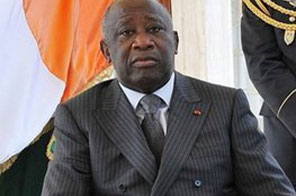Ivory Coast president dissolves 'unity' government
ABIDJAN: Ivory Coast's president has dissolved the government and disbanded the election commission, throwing into doubt the political reconciliation process in a divided country that was about to hold elections.
"The government is dissolved," President Laurent Gbagbo announced in a recorded message late Friday broadcast on national television, specifying that Prime Minister Guillaume Soro will be asked to stay on to form a new government.
The move comes two months after the government last failed to hold presidential elections to either re-elect or replace Gbagbo whose term expired five years ago. A date for the election has been set — and then canceled — every year since 2005.
Tension rose this past week after Gbagbo's party demanded the resignation of the head of the independent election commission amid accusations he was behind an attempt to add almost 500,000 illegitimate voters onto the rolls. Opposition supporters, meanwhile, accuse the ruling party of trying to disqualify voters that are not allied with Gbagbo.
On Thursday, representatives of the political factions attended a negotiation session in Ouagadougou, the capital of neighboring Burkina Faso, but could not agree on whether Robert Beugre Mambe, the head of the election commission, should step down.
In his recorded statement, Gbagbo said he was disbanding the election commission. "Mr. Mambe is running an illegal operation," Gbagbo said. "I want a government that serves the interests of the Ivorian people and not the orders of political parties."
"The mission of this new government will be, under the authority of the president and the prime minister, to complete the final actions necessary to bring Ivory Coast out of its political crisis," Gbagbo said.
The now-defunct government was the fruit of a peace agreement signed by Gbagbo's government and the New Forces rebels in 2007 following a civil war that had split the world's No. 1 cocoa producer into a rebel-held north and a government-controlled south. The unity government was composed of 33 ministers from all political parties and rebel factions.
Whether this means the country's tense political situation will dissolve back into civil war is yet to be seen, said Rinaldo Depagne, a West Africa analyst at the International Crisis Group. A hopeful sign is that Soro, the former leader of the rebels, has been asked to stay on.
"For the time, the Gbagbo-Soro alliance holds," said Depagne. "But two questions remain: Will Soro be able to form an acceptable government? And how will the opposition react?"
"There is always a risk of violence here. We've seen that over the last weeks. This is a country in crisis, there are lots of arms lying around, and there's a history of instability," Depagne said.
Gbagbo has asked Soro to begin the work of forming a new government on Monday morning.
At the heart of the impasse that has delayed elections for five years is the question of who is really Ivorian. Before its brief civil war, Ivory Coast was one of Africa's economic stars boasting a modern, cosmopolitan capital which lured tens of thousands of immigrants from poorer neighboring nations. At least a quarter of the nation's 20 million people have been disqualified from voting based on the electoral law's convoluted definition for determining eligibility, stoking tension.
While it's unclear if the president's declaration will lead the country back to conflict, some saw it as yet another attempt by the ruling party to continue holding on to power.
"Gbagbo has pulled all the stops so that the elections can be postponed," train conductor Lakpa Djaman said.






